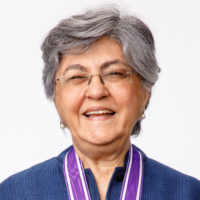
Nalini Malani
2023 Kyoto Prize Laureates
Arts(Painting, Sculpture, Craft, Architecture, Photography, Design, etc.)
/ Artist
1946 -
2023
11 /11 Sat
13:00 - 16:00
Place:Kyoto International Conference Center
Capacity:1,500 persons (FCFS)
Admission Free
Nalini Malani has created phantasmagorical spaces with approachable art forms using various media such as videos, paintings, drawings, and installations, and pioneered artistic expression that brings the voices of the voiceless to more people. She is active globally as a non-Western artist, contributing greatly to current trends reconsidering Western-centrism in art.
Creating phantasmagorical spaces with approachable art forms using various media, Nalini Malani has produced works to bring the voice of the voiceless to more people. She is one of the pioneering non-Western artists who are internationally active. It is especially noteworthy that she comes from a region of the world where many women face difficulty achieving social advancement. She has contributed to the “decentralization” of art that has been ongoing for more than 30 years since the end of the 20th century.
She came to India as a refugee during the partition of India and Pakistan. After studying art in Mumbai, she studied in Paris, where she met many intellectuals and developed an eye for observing the reality of her homeland from the outside.
With this experience, she returned to India, where various social problems, such as religious conflicts and discrimination, persisted. Facing the predicaments of the oppressed, such as women and the poor, she has produced works using various media, including videos, paintings, drawings, and installations, to appeal to a wide range of people from across the world. In the 2000s, Malani established a style for which she is now famous, taking motifs of deities from traditional mythology and using new technologies such as video and projection to create phantasmagorical spaces reminiscent of shadow plays and revolving lanterns. The oppressors, the oppressed, the goddesses who govern the world as it turns, and various animals all mingle together, spinning around and projecting their shadows on the walls. Viewers hearken to the voices of the voiceless buried in today’s society, as if they are watching a scene from a mythological play performed at a local festival.
Malani’s works enjoy a global appeal due to her superior drawing skills, the beauty of the space that envelops the viewer, and universal themes such as conflict, reconciliation, oppression, dreams, and myths. With increasing opportunities for participating in international exhibitions since the 1990s, she became the first contemporary Indian artist in 2017 to have a retrospective exhibition at the Centre Pompidou in Paris. She has been instrumental in current trends reconsidering Western-centrism in art.
Malani, who remains rooted in the realities of the local community and faced the predicaments of the oppressed, pioneered artistic expression that brings their voices to more people and has made significant contributions to a change in the conventional view of art as a non-Western artist.
For these reasons, the Inamori Foundation is pleased to present the 2023 Kyoto Prize in Arts and Philosophy to Nalini Malani.
Profile is at the time of the award.